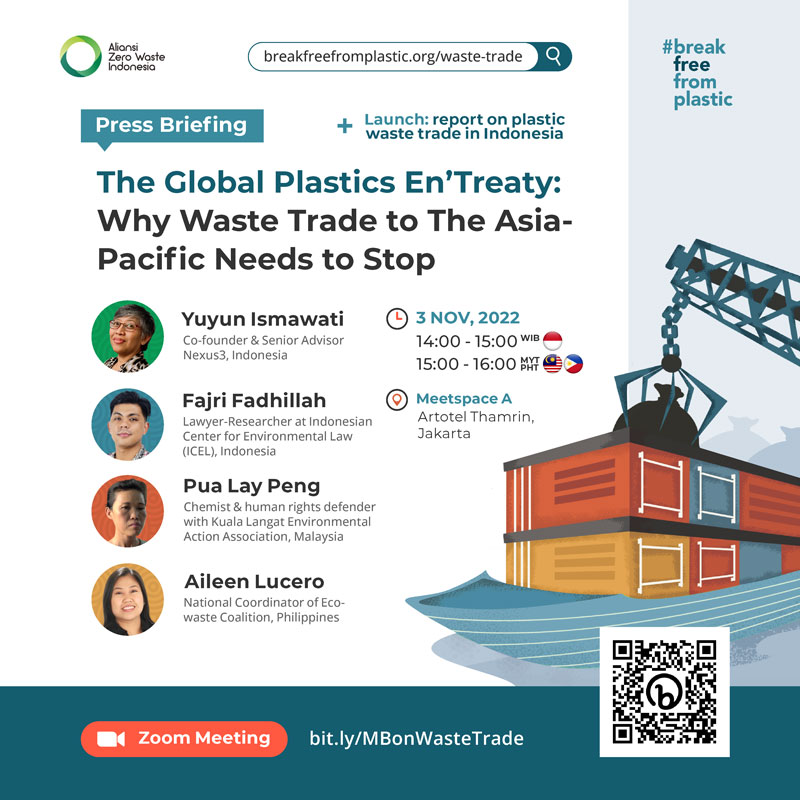What: The Global Plastics En’Treaty: why waste trade to the Asia-Pacific needs to stop
Where: Meetspace A, Artotel Thamrin, Jakarta (map link here)
When: 03 November, 2022 at 14:00 - 15:00 Indonesia | 15:00 - 16:00 Malaysia & the Philippines
Online: bit.ly/MBonWasteTrade
Background
From 28 November to 2 December 2022, the first session of the intergovernmental negotiating committee (INC) will convene in Uruguay, South America. This session plans to develop an international legally binding instrument on plastic pollution, including in the marine environment - in other words, it will set the tone for the conversation on the Global Plastic Treaty.
Policy debates to solve plastic pollution often focus on downstream solutions like strengthening waste management systems. However, waste trade - the transboundary movement of waste between countries for further treatment, disposal, or recycling - which has increased in tandem with plastic production and plastic pollution, is often left out of the conversation.
Plastic waste imports cause serious pollution and threaten the health of local communities in Indonesia, as well as several other countries in the Asia Pacific. As we build a vision for the Global Plastic Treaty, we need to address the harms caused by plastic waste trade.
As delegates at the upcoming INC meetings, Break Free From Plastic members will demand an integrated, holistic systems approach to the entire plastic value chain, from extraction to disposal. The transition to a future free from plastic pollution should allow us to hold accountable those most responsible, while engaging and amplifying the voices of those most impacted.
Objectives of the press briefing:
- Highlight the harms caused by plastic waste exports across countries: Indonesia, Malaysia, and the Philippines.
- Emphasise the need to recognise the role of the global plastic waste trade in causing plastic pollution, directly and indirectly, during the intergovernmental negotiating committee (INC) meetings in November 2022.
- Share findings from Nexus3 Foundation’s latest report on plastic waste imports to Indonesia.
Speakers
Yuyun Ismawati, co-founder and Senior Advisor at Nexus3, Indonesia
With a background in environmental health and waste convention negotiations, Yuyun works on community waste management systems. Yuyun will talk of why the waste colonialism perpetuated by illegal waste trade needs to end, and Indonesia’s government should take cognizance of its impacts on domestic waste management systems and communities. She will also share findings from the Nexus3 report.
Fajri Fadhillah, lawyer-researcher at Indonesian Center for Environmental Law (ICEL), Indonesia
As an environmental lawyer, keen on public participation in waste reduction, Fajri will cover the legal implications of flouting laws, such as the Basel Convention Plastic Waste Amendments. He will also talk about why the plastic waste trade is a false solution, and how exporters can be held accountable for the environmental and health impacts of their actions.
Pua Lay Peng, chemical engineer and human rights defender with Kuala Langat Environmental Action Association, Malaysia
For years, Pua has documented the illegal activity and pollution from imported or trafficked waste in Malaysia. She has actively campaigned against the importation of waste into the country. She will speak about the often hidden side to the global plastic waste trade – the loopholes and illegalities – and the impacts on health and human rights of communities living at the fringes of illegal plastic recycling factories in Malaysia.
Aileen Lucero, National Coordinator of Ecowaste Coalition, the Philippines
The recent ASEAN waste trade report published by Ecowaste Coalition, provides a survey of regional efforts to recognize and address the issues of plastic pollution and waste management. Aileen will talk of the progress on the ratification and acceptance of the Basel Ban Amendment in the ASEAN region, and how ASEAN civil societies and governments need to work together to hold businesses accountable.
About the Nexus3 Waste Trade Report
The latest Nexus3 waste trade report summarizes the dynamics of the plastic waste trade conditions in Indonesia - with updated data from the past three years. It covers the policy changes, volume fluctuations, trade routes, role of the recycling industry, trade violations, and most importantly, offers recommendations for Indonesia. It is curated for the Indonesian government, industry & industry associations, think tanks and NGOs as well as the general public.
This report is especially relevant as the government has lacked transparency in the implementation of waste trade violations in the past, and to equip Indonesia to learn from its mistakes which had serious impacts on the environment and the surrounding communities. The report can also serve as an example for other countries in the region to frame their own waste trade legislation.
Media Queries:
Vancher Dipatiukur, Alianzi Zero Waste Indonesia: vancher@aliansizerowaste.id
Devayani Khare, Break Free From Plastic: devayani@breakfreefromplastic.org
About Alianzi Zero Waste Indonesia (AZWI)
AZWI is an alliance that currently consists of 10 environmental organizations. AZWI campaigns for the correct implementation of the Zero Waste concept in order to mainstream various existing Zero Waste activities, programs and initiatives to be implemented in various cities and regencies in Indonesia by considering the waste management hierarchy, material life cycle, and circular economy.
About Break Free From Plastic (BFFP)
#breakfreefromplastic is a global movement envisioning a future free from plastic pollution. Since its launch in 2016, more than 2,500 organizations representing millions of supporters around the world have joined the movement to demand massive reductions in single-use plastics and push for lasting solutions to the plastic pollution crisis. BFFP member organizations and individuals share the shared values of environmental protection and social justice and work together through a holistic approach to bring about systemic change. This means tackling plastic pollution across the whole plastics value chain—from extraction to disposal—focusing on prevention rather than cure and providing effective solutions.




